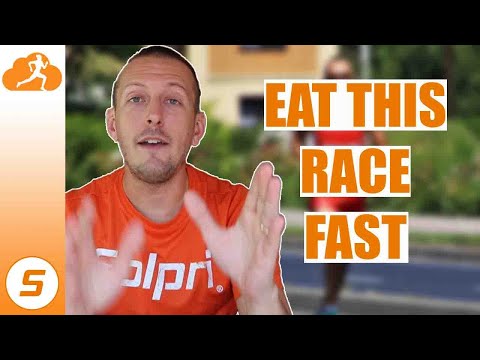You’re getting ready for your race. And you’ve heard from people, maybe from me if you’ve been on this channel before, and if not, hit subscribe to stick around with me for tips in the future. But you may have heard from people don’t try anything new on race day. And you’re thinking about your nutrition, you’re thinking, “Man, I’m going to be out there a while and I know that I need to take in something. But, what do I do? Do I do something different? I’m not supposed to do anything different, but I know it’s going to be different because it is a race.” Well, today we’re going to talk about the difference in nutrition, from training to racing.
If you haven’t been with me here on the channel before, I’m Jesse Funk. This is a show I call Runner’s High, where we talk about everything running and endurance related. Now, when we’re trying to figure out the difference between training fuel and racing fuel, it comes down to a relatively simple rule, and that is this, what works for you. I can’t tell you what works for you. I can make suggestions. But you’re going to have to try things out and see what actually works.
Now it can get a little more complicated than that. But the gist is on race day, you need to take in what works with you, is easily digested, doesn’t cause you GI distress, and gives you plenty of fuel. So, what does that mean? For some people, especially if you’re going to be going ultra long distance like say you were going ultras over Ironman distance, then you may be taking in Whole Foods throughout the race. And you can do this in training, because you’re often going to be, say, out for a long run or on the bike if you’re doing triathlon.
I would take in Whole Foods on my long rides, when we’re putting in like three and five hours. Just out there too long and you get tired of taking in gels, which are a nice quick source of carbohydrate, but just the same flavor over and over again in that gel format for hours and hours on end. It just gets unpalatable. So, you have to figure out what works for you.
My short suggestion is training versus racing comes down to this intensity. So, if you’re training at the intensity that you’re racing at, and you can eat a particular food, then you can eat that food on race day, most likely. There shouldn’t really be any difference. The difference is, as I mentioned earlier, like when I was out on those long rides, and I would take a sandwich with me, or at the time I was eating Picky Bars by the company from Jesse Thomas, who was a former pro triathlete, I would take foods like that, this whole food kind of thing.
But I’m not working really hard, it becomes harder for your body to digest those things when you’re working harder. So, if you’re racing at the same intensity that you’re training at, whatever you can stomach in training, you can stomach on race day. And you know, because you’ve done it, you do it over and over again in training.
So, this video is not very long today. That’s basically the advice. The difference is solely intensity. You can take in more Whole Foods at a lower intensity, and you’re going to take in more towards liquid the higher intensity you go. So, taking in fuel via a drink or a gel, because they are easily absorbed, easily digested is going to be the way to go for a higher intensity training day and racing day. And again, practice what you train with that you want to use on race day, and you’ll be good to go. I’ll see you next time on the next episode of Runner’s High.


